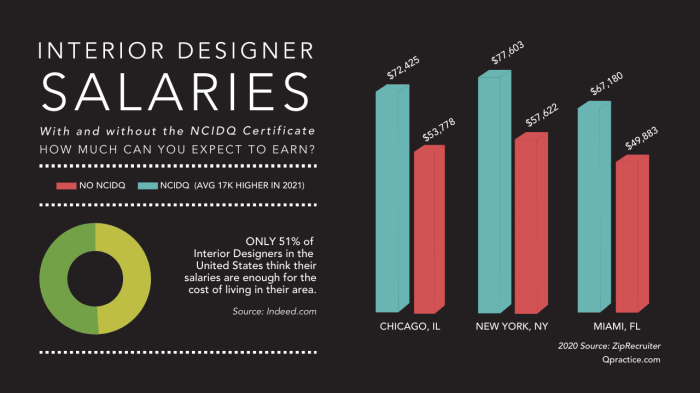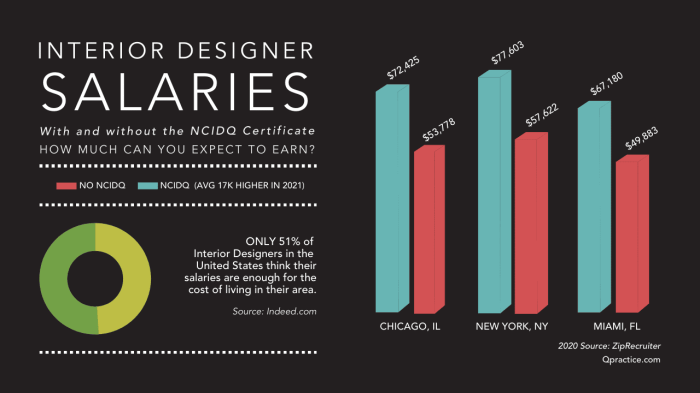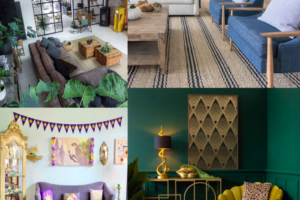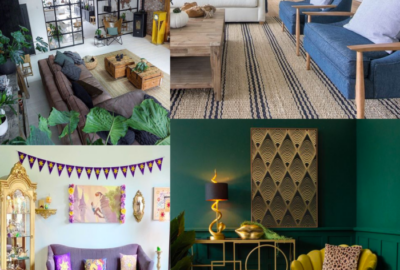How Much Do Interior Decorators Make?
Income Sources: How Much To Interior Decorators Make

How much to interior decorators make – Interior decorators have diverse income streams, allowing them to tailor their business models and financial strategies based on their preferences and target clientele. The most common income sources for interior decorators include hourly rates, project fees, commissions, and product sales.
Hourly Rates
Interior decorators often charge hourly rates for their services, particularly for smaller projects or consultations. This approach provides flexibility and allows clients to pay for the specific time and expertise they need. For example, a decorator might charge an hourly rate for initial consultations, site visits, or design development.
Project Fees
For larger projects, such as complete home renovations or commercial spaces, interior decorators often charge a fixed project fee. This fee is typically calculated based on the scope of work, the complexity of the project, and the estimated time required for completion.
Project fees provide a predictable income stream and ensure that decorators are adequately compensated for their time and effort.
Commissions
Interior decorators can also earn commissions on the products and services they recommend and source for their clients. These commissions are typically negotiated with vendors and suppliers and are a percentage of the total purchase price. For instance, a decorator might earn a commission on furniture, lighting, or artwork purchased for a client’s project.
Product Sales
Some interior decorators choose to generate income by selling their own line of products, such as furniture, textiles, or home décor items. This allows them to expand their business offerings and provide a more comprehensive design experience for their clients.
By selling their own products, decorators can control the quality, style, and pricing of their offerings, aligning them with their design philosophy and brand identity.
Partnerships
Interior decorators can also generate income through partnerships with other businesses, such as furniture stores, art galleries, or home staging companies. These partnerships can provide access to new clients, expand their product offerings, and increase their brand visibility. For example, a decorator might partner with a furniture store to offer discounts to their clients or host events showcasing their design services.
Workshops and Seminars
Interior decorators can also generate additional income by offering workshops and seminars on design topics, such as color theory, space planning, or furniture selection. These educational opportunities allow decorators to share their expertise, build their brand, and connect with potential clients.
Industry Trends

The interior design field is constantly evolving, influenced by shifting consumer preferences, technological advancements, and economic factors. Understanding these trends is crucial for aspiring and established interior decorators to navigate the industry successfully and capitalize on emerging opportunities.
Demand for Interior Decorators
The demand for interior decorators is driven by a growing desire for personalized and aesthetically pleasing living spaces.
- Rising disposable incomes and a focus on home improvement projects have fueled the demand for professional interior design services.
- The increasing popularity of home staging, especially in real estate transactions, has created a significant demand for decorators who can enhance a property’s appeal for potential buyers.
- The rise of online platforms and social media has made it easier for decorators to showcase their work and connect with clients, expanding their reach and attracting new customers.
Impact of Emerging Technologies, How much to interior decorators make
Technological advancements have transformed the way interior decorators operate, offering new tools and resources to enhance their services and efficiency.
- Virtual reality (VR) and augmented reality (AR) technologies allow clients to visualize design concepts in real-time, facilitating better communication and decision-making.
- Online design platforms and apps have made it easier for decorators to collaborate with clients remotely, share design ideas, and manage projects efficiently.
- Artificial intelligence (AI) is being used to analyze design trends, recommend color palettes, and suggest furniture layouts, streamlining the design process and offering personalized recommendations.
Growth Potential for Interior Design Professionals
The interior design industry is expected to experience continued growth in the coming years, driven by factors such as urbanization, rising disposable incomes, and a growing focus on home aesthetics.
- The increasing demand for sustainable and eco-friendly design solutions will create opportunities for decorators specializing in sustainable practices and green building materials.
- The growing trend of multi-generational living will necessitate interior design solutions that cater to the needs of different age groups and lifestyles.
- The rise of smart home technology will create opportunities for decorators to integrate technology seamlessly into interior design concepts, enhancing functionality and user experience.
Key Questions Answered
What are the most common income sources for interior decorators?
Interior decorators typically generate income through hourly rates, project fees, commissions on furniture or product sales, and partnerships with design firms or retailers. They may also offer workshops, seminars, or consultations as additional income streams.
Is it necessary to have a degree in interior design to become a successful decorator?
While a formal degree can provide a strong foundation in design principles and industry knowledge, it is not always a strict requirement. Many successful interior decorators have gained experience through apprenticeships, self-study, or practical experience in the field. However, a degree can enhance credibility and open doors to professional opportunities.
How important is networking for interior decorators?
Networking is crucial for building relationships with clients, suppliers, contractors, and other design professionals. Attending industry events, joining professional organizations, and actively engaging with the design community can lead to valuable connections and potential opportunities.





